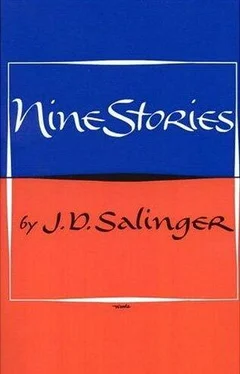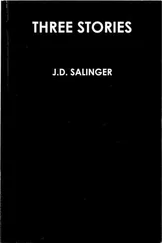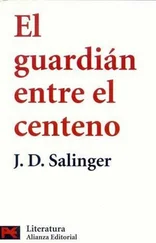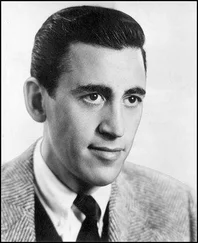Jerome Salinger - Nine Stories
Здесь есть возможность читать онлайн «Jerome Salinger - Nine Stories» весь текст электронной книги совершенно бесплатно (целиком полную версию без сокращений). В некоторых случаях можно слушать аудио, скачать через торрент в формате fb2 и присутствует краткое содержание. Год выпуска: 1953, Издательство: Little Brown, Жанр: Классическая проза, на английском языке. Описание произведения, (предисловие) а так же отзывы посетителей доступны на портале библиотеки ЛибКат.
- Название:Nine Stories
- Автор:
- Издательство:Little Brown
- Жанр:
- Год:1953
- ISBN:нет данных
- Рейтинг книги:4 / 5. Голосов: 2
-
Избранное:Добавить в избранное
- Отзывы:
-
Ваша оценка:
- 80
- 1
- 2
- 3
- 4
- 5
Nine Stories: краткое содержание, описание и аннотация
Предлагаем к чтению аннотацию, описание, краткое содержание или предисловие (зависит от того, что написал сам автор книги «Nine Stories»). Если вы не нашли необходимую информацию о книге — напишите в комментариях, мы постараемся отыскать её.
Nine Stories — читать онлайн бесплатно полную книгу (весь текст) целиком
Ниже представлен текст книги, разбитый по страницам. Система сохранения места последней прочитанной страницы, позволяет с удобством читать онлайн бесплатно книгу «Nine Stories», без необходимости каждый раз заново искать на чём Вы остановились. Поставьте закладку, и сможете в любой момент перейти на страницу, на которой закончили чтение.
Интервал:
Закладка:
I shook my head.
“One of them threw an empty whiskey bottle through my aunt’s window. Fortunately, the window was open. But does that sound very intelligent to you?”
It didn’t especially, but I didn’t say so. I said that many soldiers, all over the world, were a long way from home, and that few of them had had many real advantages in life. I said I’d thought that most people could figure that out for themselves.
“Possibly,” said my guest, without conviction. She raised her hand to her wet head again, picked at a few limp filaments of blond hair, trying to cover her exposed ear rims. “My hair is soaking wet,” she said. “I look a fright.” She looked over at me. “I have quite wavy hair when it’s dry.”
“I can see that, I can see you have.”
“Not actually curly, but quite wavy,” she said. “Are you married?”
I said I was.
She nodded. “Are you very deeply in love with your wife? Or am I being too personal?”
I said that when she was, I’d speak up.
She put her hands and wrists farther forward on the table, and I remember wanting to do something about that enormous-faced wristwatch she was wearing—perhaps suggest that she try wearing it around her waist.
“Usually, I’m not terribly gregarious,” she said, and looked over at me to see if I knew the meaning of the word. I didn’t give her a sign, though, one way or the other. “I purely came over because I thought you looked extremely lonely. You have an extremely sensitive face.”
I said she was right, that I had been feeling lonely, and that I was very glad she’d come over.
“I’m training myself to be more compassionate. My aunt says I’m a terribly cold person,” she said and felt the top of her head again. “I live with my aunt. She’s an extremely kind person. Since the death of my mother, she’s done everything within her power to make Charles and me feel adjusted.”
“I’m glad.”
“Mother was an extremely intelligent person. Quite sensuous, in many ways.” She looked at me with a kind of fresh acuteness. “Do you find me terribly cold?”
I told her absolutely not—very much to the contrary, in fact. I told her my name and asked for hers. She hesitated. “My first name is Esme. I don’t think I shall tell you my full name, for the moment. I have a title and you may just be impressed by titles. Americans are, you know.”
I said I didn’t think I would be, but that it might be a good idea, at that, to hold on to the title for a while.
Just then, I felt someone’s warm breath on the back of my neck. I turned around and just missed brushing noses with Esme’s small brother. Ignoring me, he addressed his sister in a piercing treble: “Miss Megley said you must come and finish your tea!” His message delivered, he retired to the chair between his sister and me, on my right. I regarded him with high interest. He was looking very splendid in brown Shetland shorts, a navy-blue jersey, white shirt, and striped necktie. He gazed back at me with immense green eyes. “Why do people in films kiss sideways?” he demanded.
“Sideways?” I said. It was a problem that had baffled me in my childhood. I said I guessed it was because actors’ noses are too big for kissing anyone head on.
“His name is Charles,” Esme said. “He’s extremely brilliant for his age.”
“He certainly has green eyes. Haven’t you, Charles?” Charles gave me the fishy look my question deserved, then wriggled downward and forward in his chair till all of his body was under the table except his head, which he left, wrestler’s-bridge style, on the chair seat. “They’re orange,” he said in a strained voice, addressing the ceiling. He picked up a comer of the tablecloth and put it over his handsome, deadpan little face.
“Sometimes he’s brilliant and sometimes he’s not,” Esme said. “Charles, do sit up!”
Charles stayed right where he was. He seemed to be holding his breath.
“He misses our father very much. He was s-l-a-i-n in North Africa.”
I expressed regret to hear it.
Esme nodded. “Father adored him.” She bit reflectively at the cuticle of her thumb. “He looks very much like my mother—Charles, I mean. I look exactly like my father.” She went on biting at her cuticle. “My mother was quite a passionate woman. She was an extrovert. Father was an introvert. They were quite well mated, though, in a superficial way. To be quite candid, Father really needed more of an intellectual companion than Mother was. He was an extremely gifted genius.”
I waited, receptively, for further information, but none came. I looked down at Charles, who was now resting the side of his face on his chair seat. When he saw that I was looking at him, he closed his eyes, sleepily, angelically, then stuck out his tongue—an appendage of startling length—and gave out what in my country would have been a glorious tribute to a myopic baseball umpire. It fairly shook the tearoom.
“Stop that,” Esme said, clearly unshaken. “He saw an American do it in a fish-and-chips queue, and now he does it whenever he’s bored. Just stop it, now, or I shall send you directly to Miss Megley.”
Charles opened his enormous eyes, as sign that he’d heard his sister’s threat, but otherwise didn’t look especially alerted. He closed his eyes again, and continued to rest the side of his face on the chair seat.
I mentioned that maybe he ought to save it—meaning the Bronx cheer—till he started using his title regularly. That is, if he had a title, too.
Esme gave me a long, faintly clinical look. “You have a dry sense of humor, haven’t you?” she said—wistfully. “Father said I have no sense of humor at all. He said I was unequipped to meet life because I have no sense of humor.”
Watching her, I lit a cigarette and said I didn’t think a sense of humor was of any use in a real pinch.
“Father said it was.”
This was a statement of faith, not a contradiction, and I quickly switched horses. I nodded and said her father had probably taken the long view, while I was taking the short (whatever that meant).
“Charles misses him exceedingly,” Esme said, after a moment. “He was an exceedingly lovable man. He was extremely handsome, too. Not that one’s appearance matters greatly, but he was. He had terribly penetrating eyes, for a man who was intransically kind.”
I nodded. I said I imagined her father had had quite an extraordinary vocabulary.
“Oh, yes; quite,” said Esme. “He was an archivist—amateur, of course.”
At that point, I felt an importunate tap, almost a punch, on my upper arm, from Charles’ direction. I turned to him. He was sitting in a fairly normal position in his chair now, except that he had one knee tucked under him. “What did one wall say to the other wall?” he asked shrilly. “It’s a riddle!”
I rolled my eyes reflectively ceilingward and repeated the question aloud. Then I looked at Charles with a stumped expression and said I gave up.
“Meet you at the corner!” came the punch line, at top volume.
It went over biggest with Charles himself. It struck him as unbearably funny. In fact, Esme had to come around and pound him on the back, as if treating him for a coughing spell. “Now, stop that,” she said. She went back to her own seat. “He tells that same riddle to everyone he meets and has a fit every single time. Usually he drools when he laughs. Now, just stop, please.”
“It’s one of the best riddles I’ve heard, though,” I said, watching Charles, who was very gradually coming out of it. In response to this compliment, he sank considerably lower in his chair and again masked his face up to the eyes with a corner of the tablecloth. He then looked at me with his exposed eyes, which were full of slowly subsiding mirth and the pride of someone who knows a really good riddle or two.
Читать дальшеИнтервал:
Закладка:
Похожие книги на «Nine Stories»
Представляем Вашему вниманию похожие книги на «Nine Stories» списком для выбора. Мы отобрали схожую по названию и смыслу литературу в надежде предоставить читателям больше вариантов отыскать новые, интересные, ещё непрочитанные произведения.
Обсуждение, отзывы о книге «Nine Stories» и просто собственные мнения читателей. Оставьте ваши комментарии, напишите, что Вы думаете о произведении, его смысле или главных героях. Укажите что конкретно понравилось, а что нет, и почему Вы так считаете.











